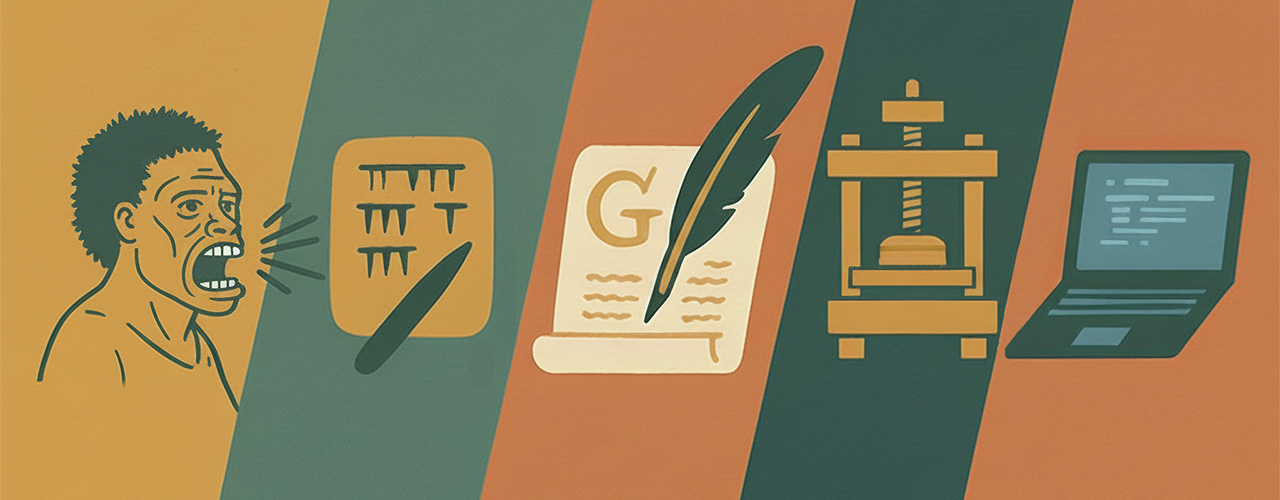Series•Shaping the AI Frontier — Part 1 of 3
From Clay Tablets to AI: Why Doubt Always Greets the Next Leap
Ten thousand years ago, your cousin wandered back into the village clutching a lump of clay. Today, he's waving code and shouting about AI. History shows us that doubt is always the first sound we make when standing at the lip of something vast.
Ten thousand years ago, your cousin wandered back into the village clutching a lump of clay. He was wild-eyed, jabbering about the strange scratches he'd seen carved into it. "These marks can carry meaning," he said. You rolled your eyes. You were a potter, or a baker, or a metalsmith. What did scratches on mud have to do with you?
That cousin was holding the beginnings of cuneiform, one of humanity's earliest writing systems. At the time it looked like nonsense. Within a few centuries, it reshaped memory, trade, and the way humans thought about themselves.
Fast forward, and here we are again. Only this time, the cousin isn't waving clay. He's waving code. He's shouting about artificial intelligence — the most astonishing best thing ever, or, depending on who you listen to, the harbinger of doom. AI has already pipped aliens at the post. And now we're all trying to work out whether we've just invented the wheel again… or something closer to the topology of madness.
Doubt Is Always the First Sound We Make
Every great leap starts with doubt. You grunt before you sing. You roll your eyes before you write. You say, "This won't touch me" — and then it does.
Socrates fretted that writing would rot memory. Monks feared the printing press would hollow out the soul of books. Workers smashed looms to stop machines swallowing their livelihoods.
"Writing, father, has introduced forgetfulness into the minds of those who have learned it." — Socrates, Phaedrus
What looked like madness at first became the bedrock of everything that followed. Doubt isn't failure. Doubt is the sound a species makes when it stands at the lip of something vast.
From Grunts to Software
It amazes me that intelligence seems to spill out of information itself. Start with a grunt, discover singing, stumble into words, scratch out marks, invent alphabets, make code. By the time you get to software, maybe AI is inevitable.
Once you make the wheel, you can't but use it. Once you make AI, you can't but reckon with it.

A Hopeful Optimist's View
I don't think the doubters are wrong to worry. Data centres rising like cathedrals, draining water and power from towns and rivers — that's not a small thing. Nor is the question of who governs this intelligence: democracy or autocracy.
But I can't quite bring myself to despair. I'm a hopeful optimist. History shows that every tool carries both burden and gift. Writing gave us bureaucracy and poetry. Printing gave us propaganda and science. AI may yet give us ruin and renewal.
If we take part in shaping it — through open-source movements, through regulation, through conversations like this one — we might reach what Emad Mostaque once imagined: a "stable diffusion of prosthetic intelligence." Not a mind to replace us, but an extension of our own.
Meeting the Cousin Again
So here's the question: when the cousin comes knocking this time — not with clay, but with code — do we laugh him off, smash the tablets, or sit down and ask what he's really found?
Because history whispers the same thing, over and over: you don't roll back the wheel. The only choice is whether you grab hold of it, or let it run over you.
Ready to Automate Your Business?
Let's discuss how AI automation can transform your operations.
Get Started Today
